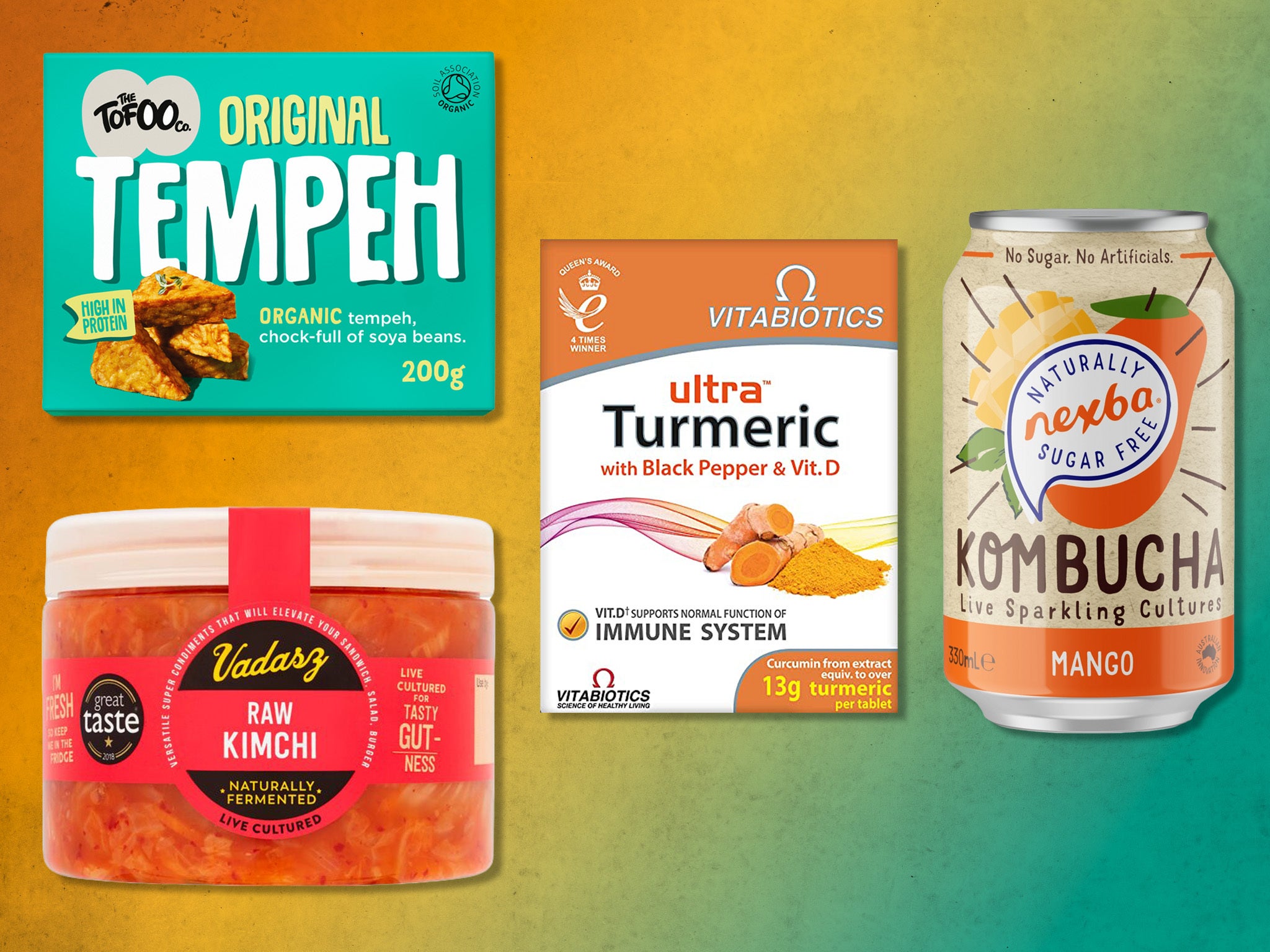Foods That Support Gut Microbiome Health : Transform Your Gut with These Power Foods

Foods that support gut microbiome health include probiotics, fermented foods, fiber-rich foods, and prebiotic foods. These foods promote the growth of beneficial bacteria in the gut, which can improve digestion and overall health.
By incorporating these foods into your diet, you can help maintain a healthy balance of gut bacteria and support optimal gut microbiome health.

Credit: www.independent.co.uk
1. The Importance Of A Healthy Gut Microbiome
A healthy gut microbiome plays a significant role in our overall health, with connections to various health conditions. The gut microbiome refers to the trillions of bacteria and other microbes that reside in our digestive system. These microbes help to break down food, support the absorption of nutrients, and regulate our immune system.
When our gut microbiome is out of balance, it can lead to digestive issues, inflammation, and even impact our mental health. Research shows that a healthy gut microbiome is linked to improved digestion, enhanced immune function, and reduced risk of chronic diseases.
To support a healthy gut microbiome, it is essential to consume a diet rich in fruits, vegetables, whole grains, and fermented foods. These foods provide the necessary nutrients and prebiotics that nourish the beneficial bacteria in our gut, promoting optimal gut health and overall well-being.
2. Understanding Gut Microbiome: Basics And Functions
The gut microbiome is a complex community of microorganisms that reside in our digestive tract. These microorganisms play a vital role in supporting our overall health and well-being. They help break down food, produce essential nutrients and vitamins, and aid in the digestion and absorption of nutrients.
Additionally, the gut microbiome plays a crucial role in our immune system, serving as a barrier against harmful pathogens. It also influences our mental health and mood through the production of neurotransmitters. Understanding the gut microbiome and its functions is essential for maintaining a healthy gut.
By nurturing and supporting our gut microbiome through proper nutrition and lifestyle choices, we can promote optimal gut health and overall well-being.
3. Factors Affecting Gut Microbiome Health
Factors such as diet, lifestyle, stress, antibiotics, and medications play a significant role in gut microbiome health. The food we consume directly affects our gut health, as certain foods promote the growth of beneficial bacteria. Unhealthy eating habits and a poor diet contribute to an imbalance in the gut microbiome, which can lead to digestive issues.
Lifestyle choices and high stress levels can also disrupt the microbiome, impacting digestion and overall gut health. Additionally, the use of antibiotics and certain medications can have a negative effect on the gut by killing off both harmful and beneficial bacteria.
It is important to be mindful of these factors and make conscious choices to support a healthy gut microbiome.
4. Power Foods For A Healthy Gut Microbiome
Fiber-rich foods play a crucial role in supporting a healthy gut microbiome. Not only do they provide nourishment for the beneficial bacteria in our gut, but they also aid in digestion and promote regular bowel movements. Incorporating foods such as fruits, vegetables, whole grains, and legumes into our diet can increase our fiber intake and improve the health of our gut.
Additionally, probiotic-rich foods, like yogurt and sauerkraut, introduce beneficial bacteria into our digestive system, further enhancing the diversity and balance of our gut microbiome. Prebiotic foods, such as garlic, onions, and bananas, serve as fuel for these beneficial bacteria, allowing them to thrive and multiply.
By including these power foods in our diet, we can support the health and well-being of our gut microbiome, leading to improved digestion and overall wellness.
5. Incorporating Gut-Healthy Foods Into Your Diet
Eating a fiber-rich diet plays a crucial role in supporting a healthy gut microbiome. Including foods like fruits, vegetables, whole grains, and legumes can help increase your fiber intake. Opt for whole fruits instead of juices and incorporate vegetables in every meal.
Experiment with various grains like quinoa, brown rice, and oatmeal. Legumes such as lentils, chickpeas, and beans are also excellent sources of fiber. To promote a healthy gut, try out creative ways to add probiotic-rich foods to your meals. Include fermented foods like yogurt, sauerkraut, and kefir.
You can also explore recipes that feature gut-friendly ingredients like garlic, ginger, and turmeric. By incorporating these tips into your diet, you can support the health of your gut microbiome and overall wellbeing.
6. Transforming Your Gut Through Balanced Nutrition
Our gut health is profoundly influenced by the foods we consume. A diverse diet, incorporating various food groups, is vital for gut microbiome health. Combining different types of foods can optimize our gut health and provide numerous benefits. One effective way to enhance gut microbiome diversity is through the consumption of fermented foods.
Fermented foods such as yogurt, kefir, sauerkraut, and kimchi help introduce beneficial bacteria into our gut and promote a healthy microbiome. These foods can aid in digestion, boost nutrient absorption, and support a strong immune system. By incorporating a range of nutritious foods and incorporating fermented options, we can transform our gut health and promote optimal well-being.
7. Additional Lifestyle Strategies For A Healthy Gut
Managing stress and practicing self-care are significant lifestyle strategies for a healthy gut. Exercise has a positive impact on gut microbiome health. Getting enough sleep is also crucial for maintaining a healthy gut. By incorporating these additional lifestyle strategies, you can support and promote the health of your gut microbiome.
8. Seeking Professional Guidance For Gut Microbiome Health
Consulting a healthcare professional or registered dietitian can provide valuable guidance on improving gut health. These experts can assess your individual needs and create personalized nutrition plans tailored to support your gut microbiome. With their knowledge and experience, they can recommend specific foods and dietary modifications that promote a healthy balance of gut bacteria.
By seeking professional guidance, you can receive expert advice and support to optimize your gut health and overall well-being. Remember, everyone’s gut microbiome is unique, so personalized recommendations are crucial for achieving optimal results. So, don’t hesitate to reach out for professional help if you’re looking to take your gut health to the next level.
9. Maintaining A Healthy Gut Microbiome For Long-Term Wellness
Maintaining a healthy gut microbiome is crucial for long-term wellness. Sustaining a balanced diet and gut-friendly lifestyle aids in this goal. You can monitor and track improvements in gut health by observing any changes in digestion or overall well-being. It’s essential to prioritize gut microbiome health as it directly impacts our overall health.
By making conscious food choices, such as including fibrous foods like fruits, vegetables, and whole grains, you can support the growth of beneficial bacteria in your gut. Additionally, incorporating fermented foods like yogurt, kefir, and sauerkraut helps promote a healthy gut.
Regular exercise and stress management techniques, like meditation or deep breathing exercises, can also contribute to a healthy gut microbiome. Overall, adopting these lifelong habits leads to a happier and healthier gut.
Frequently Asked Questions For Foods That Support Gut Microbiome Health
What Are The Best Foods For Gut Microbiome Health?
Eating a variety of fiber-rich foods like fruits, vegetables, whole grains, and legumes can promote a healthy gut microbiome. Additionally, fermented foods like yogurt and kimchi provide probiotics, which help maintain a healthy balance of gut bacteria. Incorporating prebiotic-rich foods such as onions, garlic, and bananas can also support the growth of beneficial bacteria in the gut.
How Does The Gut Microbiome Affect Our Health?
The gut microbiome plays a crucial role in digestion, nutrient absorption, immune function, and even mental health. A healthy gut microbiome helps prevent various digestive disorders, boosts immunity, and supports overall well-being. Imbalances in the gut microbiome have been linked to conditions like irritable bowel syndrome (ibs) and inflammatory bowel disease (ibd).
Can Gut Microbiome Health Be Improved Through Diet Alone?
While diet is a key factor in maintaining a healthy gut microbiome, other lifestyle factors also play a role. Regular exercise, managing stress levels, getting enough sleep, and avoiding excessive antibiotic use can further support gut health. Consulting with a healthcare professional or registered dietitian can help develop a personalized plan to optimize gut microbiome health.
Conclusion
To maintain a healthy gut microbiome, it is crucial to incorporate the right foods into your diet. By including foods such as yogurt, kefir, and sauerkraut, you can introduce beneficial bacteria into your gut which can improve digestion and overall gut health.
Fiber-rich foods like whole grains, fruits, and vegetables act as prebiotics, feeding the good bacteria in your gut and promoting their growth. Additionally, fermented foods like kimchi and miso contain probiotics that can support a diverse and balanced gut microbiome.
It is also essential to avoid processed and sugary foods, as they can disrupt the balance of bacteria in your gut. Incorporating these gut-friendly foods into your diet can have significant positive impacts on your overall health and well-being. So start making small changes to your diet today and prioritize the health of your gut microbiome!














